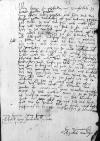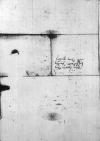Letter #5838
Elisabeth DONCHE to Ioannes DANTISCUSBruges, 1532-01-17
English register:
Rumour has it that the Emperor [Charles V] will depart from the Netherlands. Elisabeth Donche supposes Dantiscus will follow the imperial court. She thanks him for his friendship and will keep fond memories of him.
She regrets that she could not come to Brussels to personally say goodbye; therefore she is saying goodbye by letter. She is sending Dantiscus as a parting gift Parmesan (cheese?) of local origin, although it is not as refined as the Italian original. As her compatriots are less sophisticated than the Italians, so are their products less refined than theirs. She offers him her services, whenever needed. In a postscript she conveys greetings from Jacob Snaggaert.
Manuscript sources:
Prints:
| ||||||
Text & apparatus & commentaryPlain textText & commentaryText & apparatus
Mijn heere den am paper damaged⌈[am]am paper damaged⌉bassaduer van den con paper damaged⌈[con]con paper damaged⌉inck van Polen
Mijn heere, men zegghet ons hier, dat den keyser zoude vertrecken. Est zoo datmen zegghet zoo dinke ic wel dat ghij oeck mette gheselscap zult vertrecken en dat ic hu niet meer zien en zal up dit pas. Ic en weet oft up alle huwe goed(e) vrienscap die ghij mij ghetoech hebt on the margin, in the hand of sender⌈hebthebt on the margin, in the hand of sender⌉ en bidde al est dat wij verre van anderen zijn zullen dat daer omme de vrienscap niet al vergheten mach zijn. Ic zoude wel ghement hebb(en) noch te Brussel an hu oerlof ghenomen hebb(en) maer de zake en es zoo niet gheleghen ghewest dat mijn man superinscribed, in the hand of sender⌈manman superinscribed, in the hand of sender⌉ daer ghecom(m)en es voer het vertrecken van d(en) keiser. Zoo wille ic oerlof nemen van hu bij briefven en zend(en)(?) hu een cleijn present van een parmisaen van ons lant, niet te ghelickken den parmizaen van Ijtalien want de lied(en) van onsen land(e) en zijn zoo suptil niet als de Ijtalijaten zijn, zoo en mach oeck het ghene dat van daer comt, hu biddende dat in danke te nemen. Mijn heere, waerder eenghe dienst in dit quartier daer in ic hu dienst of vrienscap mochte doen mij dat bevelen zout mij zou altijt ghereet vi(n)d(en), dat kent God die hu verlene dat hu herte meest begheert.
Ghescreven te Brugghe, den XVII-sten in Janner XXXI.
Hu diennaresse, Elyzabet Donche
Postscript:
Mijn heere, Iacoop Snaggaert ghebiet hem herteluk in huwe goed(en) gracie.


 AAWO, AB, D.90, f. 3v
AAWO, AB, D.90, f. 3v